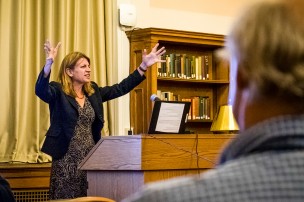Wednesday's Constitution Day Lecture centered on the rights of Native Americans.
This year’s Constitution Day lecture on Wednesday, Sept. 16, titled “Birthright Citizenship on Trial — Immigration and Indignity,” centered on the history of the Fourteenth Amendment and what it meant for immigrants and Native Americans historically. Professor Bethany Berger ’90 of University of Connecticut School of Law delivered the lecture.
The debate over birthright citizenship, a privilege granted by the Fourteenth Amendment, has become an unexpected issue in this year’s Republican primary. Donald Trump, the leading Republican candidate, recently said, “We’re the only place, just about, that’s stupid enough to do it.” Eight other candidates followed suit, agreeing that the practice, dating back to the Reconstruction Era, should end.
“She laid out our disposition [of] foreigners and our disposition for Indians,” said Visiting Assistant Professor of Government Professor Sam Rosenfeld, who attended the lecture.
Berger is a former judge for the Southwest Intertribal Court of Appeals and the Director of the Native American Youth Law Project at DNA-People Legal Services, which works with the Hopi and Navajo nations. She graduated in 1990 from the University with a degree in Government.
Birthright citizenship has roots in colonial times, but Berger posed the question, “What’s the difficulty in saying the birthright citizenship applies to everyone on U.S. soil [during the Colonial era]?” The answer? Slavery.
She continued further to speak about the rights of free African Americans and the Dred Scott decision. After the Dred Scott decision declared that African Americans were not citizens, regardless of their freedom, only white Americans received the privilege of Birthright Citizenship. This was until the Fourteenth Amendment was passed in 1868, affirming that “All persons born or naturalized in the United States, and subject to the jurisdiction thereof, are citizens of the United States and of the State wherein they reside.”
“The key phrase here is ‘Subject to the jurisdiction thereof,’” Berger said.
She added that this excludes children of ambassadors, children of military enemies, and most importantly, Native Americans.
Berger went on to show the relationship that Native Americans and immigrants had with the Fourteenth Amendment, by using two key Supreme Court cases, Elk V. Wilkins in 1884 and United States v. Wong Kim Ark.
“The court documents [in Elk V. Wilkins] indicated that [John Elk] wanted to assimilate, but I suspect that he was seeking citizenship so he could keep his land,” Berger said. “[He was denied citizenship because] although they were on American soil, Indians have some sort of independent nationhood.”
Speaking to United States v. Wong Kim Ark, Berger spoke of how Wong Kim Ark spent five months on various steamships off the coast of San Francisco. He was eventually granted access to the United States. The Supreme Court interpreted the Fourteenth Amendment to include children of foreigners that are permanently living in the United States.
“Why was it so important for Ark to prove his citizenship?” Berger said. “Because it was the only way for him to get back because of anti-Chinese immigrant laws.”
Professor Berger also commented on the current xenophobic rhetoric present in the Republican presidential primaries, including the term “anchor babies.” Rosenfeld asked if this argument of anchor babies comes up historically.
“That argument doesn’t make any sense legally because simply having a child does not grant you citizenship,” Berger said.
She added that this terminology and the overall discussion of ending birthright citizenship is motivated by xenophobia and racism. Associate Professor of American Studies Kehaulani Kauanui agreed.
“It is a form of racist, white-dominated nativism that cannot be separated from the enduring structures of settler colonialism and the disregard for indigenous peoples’ sovereignty,” Kauanui said. “Like the political bumper sticker says, ‘Who you calling an illegal alien, pilgrim?’”
Rosenfeld further spoke about the event.
“What I found most intriguing is what accounts for the countries with Birthright Citizenship,” Rosenfeld said. “We have seen other examples of marginal or dubious constitutional interpretations that have gained mainstream legitimacy. One example is the individual mandate in Obamacare is unconstitutional. That argument was dismissed like Professor Berger was dismissing the argument about the fourteenth amendment.”
Andy Hirsh ’18 expressed that he found the lecture fascinating.
“I never thought about Chinese immigration and the enormity of it,” he said. “I didn’t know how much Chinese people knew about American prosperity.”
Rosenfeld added to the conversation regarding the Fourteenth Amendment.
“It is something to take pride in,” Rosenfeld said. “Our country is a nation built on traditions and ideas, not bloodlines. Anyone that can accept those ideas is entitled to belonging.”
-
Semay
